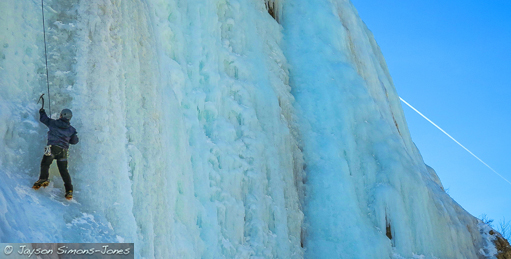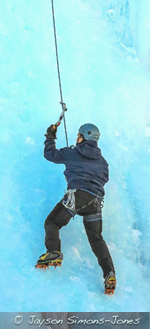© 2014 The Texas Lawbook.
By Patricia Baldwin – (Aug. 1) – “Ice climbing is brutish. That’s something more suited to your level of climbing.”
Perhaps it was the rock climbing guide’s Corsican accent, but Houston litigator Glenn Legge interpreted the comment as a compliment.

The partner at Legge, Farrow, Kimmitt, McGrath & Brown in Houston knows about risk.
He has won some important verdicts and settlements and has an impressive client list, including Lloyd’s of London Underwriters and ExxonMobil. His winning defense argument in The Houston Exploration Company vs. Lary Insurance Sevices Inc, et al. No. 08-0890, established precedent in the way insurance contracts are written and has been referenced in the insurance dispute surrounding the Deepwater Horizon oil spill.
 But ask him which is the more formidable challenge—arguing before the Supreme Court of Texas or climbing the crux pitch on the Curecanti Monster mountain in Colorado, he pauses and recalls responding to former Chief Justice Wallace Jefferson’s “focused questions” during the Houston Exploration argument.
But ask him which is the more formidable challenge—arguing before the Supreme Court of Texas or climbing the crux pitch on the Curecanti Monster mountain in Colorado, he pauses and recalls responding to former Chief Justice Wallace Jefferson’s “focused questions” during the Houston Exploration argument.
“Hook me up to a heart rate monitor, and it would be a very close call as to which would make my heart beat faster,” he says. “Fortunately, both experiences ended well.”
Bass Wallace Jr., senior vice president and general counsel of TETRA Technologies Inc. in The Woodlands, has worked with Legge for a dozen years. With children in the same grade, the two families have traveled together.
However, Wallace notes with a laugh, the families go to the beach. He has not been tempted to join Legge at ice climbing, but acknowledges, “Any hobby that forces you to focus is good.”
And it’s OK when his outside attorney tells him that he will be unavailable—really unavailable.
“I’m suspicious of anybody who’s available all the time,” he jokes, adding that he thinks time off “makes you more efficient.”
Legge says he finds that ice climbing has many similarities with the law.
“Every case is new at one point in time. You can make assumptions, but you have to figure it out,” he says. “I don’t think anybody who has tried a case will tell you it goes exactly as planned. You’ve got to deal with unanticipated developments.”
Last year, Legge traveled to Lake City, Colorado, to work on his climbing technique. One of the technique exercises involved climbing with only one ice tool—climbers use two—to work on his balance, body angle and footwork.
“That was a very interesting exercise,” he recalls.
He points out the biggest difference between rock climbing and ice climbing. On rocks, climbers are looking for handholds and footholds that exist. On ice, climbers create handholds and footholds with ice tools and crampons on their boots.

To be prepared, Legge relies on good equipment and good advice. For the latter, he often has counted on licensed mountain guide Steve Banks, who can be found in Crested Butte, Colorado, much of the year and in Chamonix, France, in the summer.
Banks says that Legge always shows up with a “let’s go for it” attitude.
“While we don’t always reach the top, he pushes his personal limits, works as hard as he can and uses sound judgment when it is time to pull back,” Banks says. “It takes a lot of strength and will power to be a good ice climber, and even more to realize when it is time to back off.”
 At 57, Legge still has ice-climbing goals—“as long as I stay physically and mentally fit.”
At 57, Legge still has ice-climbing goals—“as long as I stay physically and mentally fit.”
In particular, he wants to go back to the Curecanti Monster, one of the longest ice climbs in Colorado. Banks also has been encouraging him to take on the Chere Coulior climb outside Chamonix. Then there’s the Slipstream climb in the Canadian Rockies.
Legge says, “The common elements of all these possible climbs are a great guide, lots of preparation and acknowledging that none of them will turn out exactly as I imagined them.”
Do you have a special avocation, pro bono project or other lifestyle interest to share? Please email patricia.baldwin@texaslawbook.net.
© 2014 The Texas Lawbook. Content of The Texas Lawbook is controlled and protected by specific licensing agreements with our subscribers and under federal copyright laws. Any distribution of this content without the consent of The Texas Lawbook is prohibited.
If you see any inaccuracy in any article in The Texas Lawbook, please contact us. Our goal is content that is 100% true and accurate. Thank you.
